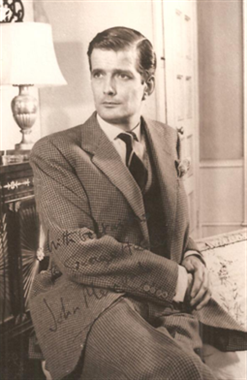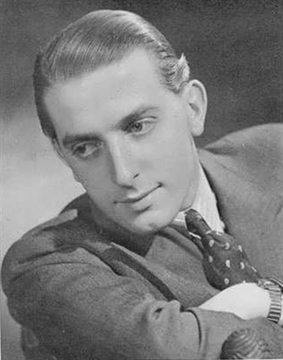
Michael Jeremy Thomas Clyde is an English actor and musician. During the 1960s, he was one-half of the folk duo Chad & Jeremy. Their first song was the 1963 hit "Yesterday’s Gone". The duo became more successful in America than in their native country. Clyde has enjoyed a long television acting career, often playing upper-middle class or aristocratic characters.

Hugh Emrys Griffith was a Welsh actor. Described by BFI Screenonline as a "wild-eyed, formidable character player", Griffith appeared in over 100 theatre, film, and television productions in a career that spanned over 40 years. He was the second-ever Welsh-born actor to win an Academy Award, winning a Best Supporting Actor Oscar for his role in Ben-Hur (1959), with an additional nomination for Tom Jones (1963).

Peter Woodthorpe was an English actor who supplied the voice of Gollum in the 1978 Bakshi version of The Lord of the Rings and the BBC's 1981 radio serial. He also provided the voice of Pigsy in the cult series Monkey and played Max, the pathologist, in early episodes of Inspector Morse.

Ernest Clark MC was a British actor of stage, television and film.

John Herman Merivale was a Canadian-born British theatre actor, and occasional supporting player in British films.

Sir John Selby Clements, CBE was a British actor and producer who worked in theatre, television and film.

Ursula Jean McMinn, better known as Ursula Jeans, was an English film, stage, and television actress.
Oscar Morris Quitak was a British stage, film and television actor.

Geoffrey Forbes Lumsden was a British character actor who had a lengthy career on television. He often played pompous upper-class characters, army officers and the like.
Elizabeth Anne Seal is a British actress. In 1961, she won the Tony Award for Best Leading Actress in a Musical for her performance in the title role of Irma La Douce.

Jack William Frederick Gwillim was an English character actor.

Robert Urquhart was a Scottish character actor who worked on the stage, for British television, and in film. His breakthrough role was Paul Krempe in The Curse of Frankenstein in 1957, along with Peter Cushing and Christopher Lee.

Jane Baxter was a British actress. Her stage career spanned half a century, and she appeared in a number of films and in television.
Robin Midgley was a director in theatre, television and radio and responsible for some of the earliest episodes of Z-Cars and for the television version of the Royal Shakespeare Company's Wars of the Roses.

Edward Atienza was a British stage and film actor. He made his first London theatre appearance in the role of Mole in Toad of Toad Hall at the Prince's Theatre.

Isabel Dean was an English stage, film and television actress.
Gerald Douglas Savory was an English writer and television producer specialising in comedies.

Alexander Mervyn Archdale was a British actor, manager and theatre producer. He had a very long career in both the theatre and in film, stretching from the 1930s to the 1980s. He spent the latter part of his life and career in Australia.

Richard Warner was an English actor. He appeared in more than one hundred films from 1938 to 1988. Also active on stage, his theatre work included Gerald Savory's George and Margaret on Broadway in 1937, and the original production of J.B. Priestley's When We Are Married in London's West End in 1938. He portrayed a judge in several episodes of Granada television's Crown Court from 1972 to 1973.

Geoffrey Hibbert was an English stage, film and television actor.
















